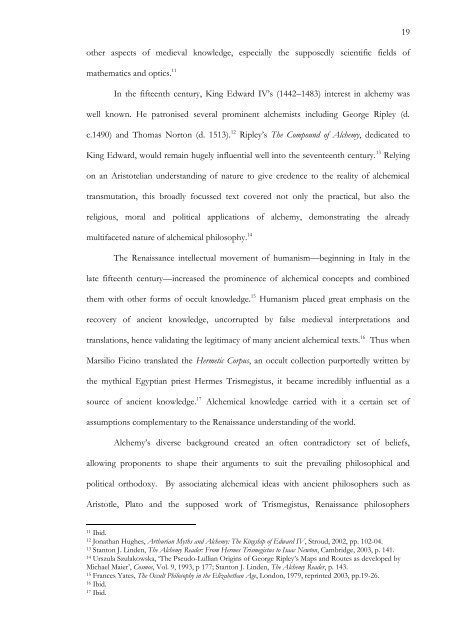The Alchemical Patronage of Sir William Cecil, Lord Burghley
The Alchemical Patronage of Sir William Cecil, Lord Burghley
The Alchemical Patronage of Sir William Cecil, Lord Burghley
You also want an ePaper? Increase the reach of your titles
YUMPU automatically turns print PDFs into web optimized ePapers that Google loves.
other aspects <strong>of</strong> medieval knowledge, especially the supposedly scientific fields <strong>of</strong><br />
mathematics and optics. 11<br />
In the fifteenth century, King Edward IV‘s (1442–1483) interest in alchemy was<br />
well known. He patronised several prominent alchemists including George Ripley (d.<br />
c.1490) and Thomas Norton (d. 1513). 12 Ripley‘s <strong>The</strong> Compound <strong>of</strong> Alchemy, dedicated to<br />
King Edward, would remain hugely influential well into the seventeenth century. 13 Relying<br />
on an Aristotelian understanding <strong>of</strong> nature to give credence to the reality <strong>of</strong> alchemical<br />
transmutation, this broadly focussed text covered not only the practical, but also the<br />
religious, moral and political applications <strong>of</strong> alchemy, demonstrating the already<br />
multifaceted nature <strong>of</strong> alchemical philosophy. 14<br />
<strong>The</strong> Renaissance intellectual movement <strong>of</strong> humanism—beginning in Italy in the<br />
late fifteenth century—increased the prominence <strong>of</strong> alchemical concepts and combined<br />
them with other forms <strong>of</strong> occult knowledge. 15 Humanism placed great emphasis on the<br />
recovery <strong>of</strong> ancient knowledge, uncorrupted by false medieval interpretations and<br />
translations, hence validating the legitimacy <strong>of</strong> many ancient alchemical texts. 16 Thus when<br />
Marsilio Ficino translated the Hermetic Corpus, an occult collection purportedly written by<br />
the mythical Egyptian priest Hermes Trismegistus, it became incredibly influential as a<br />
source <strong>of</strong> ancient knowledge. 17 <strong>Alchemical</strong> knowledge carried with it a certain set <strong>of</strong><br />
assumptions complementary to the Renaissance understanding <strong>of</strong> the world.<br />
Alchemy‘s diverse background created an <strong>of</strong>ten contradictory set <strong>of</strong> beliefs,<br />
allowing proponents to shape their arguments to suit the prevailing philosophical and<br />
political orthodoxy. By associating alchemical ideas with ancient philosophers such as<br />
Aristotle, Plato and the supposed work <strong>of</strong> Trismegistus, Renaissance philosophers<br />
11 Ibid.<br />
12 Jonathan Hughes, Arthurian Myths and Alchemy: <strong>The</strong> Kingship <strong>of</strong> Edward IV, Stroud, 2002, pp. 102-04.<br />
13 Stanton J. Linden, <strong>The</strong> Alchemy Reader: From Hermes Trismegistus to Isaac Newton, Cambridge, 2003, p. 141.<br />
14 Urszula Szulakowska, ‗<strong>The</strong> Pseudo-Lullian Origins <strong>of</strong> George Ripley‘s Maps and Routes as developed by<br />
Michael Maier‘, Cosmos, Vol. 9, 1993, p 177; Stanton J. Linden, <strong>The</strong> Alchemy Reader, p. 143.<br />
15 Frances Yates, <strong>The</strong> Occult Philosophy in the Elizabethan Age, London, 1979, reprinted 2003, pp.19-26.<br />
16 Ibid.<br />
17 Ibid.<br />
19















